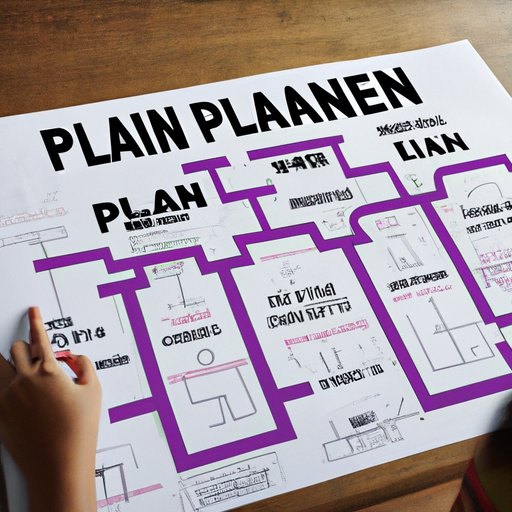Introduction
Time management is the ability to use one’s time effectively or productively, especially at work. It involves setting goals, planning and organizing, prioritizing tasks, scheduling, and utilizing available resources. With better time management skills, you can be more productive and efficient, which can lead to greater success in both your personal and professional life.
In this article, we’ll explore some effective strategies for managing your time. We’ll look at making a to-do list, prioritizing tasks, breaking down large projects into smaller pieces, setting reasonable deadlines, taking regular breaks, eliminating distractions, and planning ahead for potential challenges.
Make a To-Do List
Making a to-do list is one of the most effective time management strategies. Writing down tasks helps you to organize your thoughts and keep track of what needs to be done. It also allows you to prioritize tasks and make sure that the most important ones are completed first.
Benefits of Writing Down Tasks
Writing down tasks has several benefits. It helps you to stay focused and on track, eliminates the need for you to remember all of your tasks, and reduces stress. You’ll also have a clear overview of what needs to be done, which can help you to plan your day more efficiently.
Tips for Creating an Effective To-Do List
When creating a to-do list, it’s important to be as specific as possible. Break tasks down into smaller, more manageable chunks, and be sure to include any deadlines or due dates. Prioritize tasks according to importance, and set realistic expectations for yourself. Finally, be sure to review and update your list regularly.
Prioritize Tasks
Once you’ve created your to-do list, the next step is to prioritize tasks. This will allow you to focus on the most important tasks first and ensure that they get done in a timely manner.
Determining What’s Important
The first step in prioritizing tasks is to determine what’s important. Consider factors such as urgency, importance, and deadline when making this decision. Urgent tasks should be completed first, followed by important tasks that don’t have a specific deadline. Finally, tasks that are neither urgent nor important should be completed last.
Ranking Tasks in Order of Importance
Once you’ve determined which tasks are most important, it’s time to rank them in order of importance. Start with the most important task and work your way down the list. As you complete tasks, cross them off your list and move on to the next one. This will help you stay motivated and on track.
Break Down Large Projects into Smaller Pieces
Breaking down large projects into smaller pieces can help you manage your time more effectively. By breaking projects down into smaller chunks, you’ll be able to focus on one task at a time and make steady progress towards completing the project.
Benefits of Breaking Down Projects
Breaking down projects into smaller pieces has several benefits. It makes tasks more manageable and easier to complete, reduces the amount of time needed to complete the project, and eliminates the feeling of being overwhelmed. Additionally, breaking down projects into smaller tasks can help you to identify any potential problems before they occur.
Tips for Breaking Down Projects
When breaking down projects into smaller pieces, start by writing down each task that needs to be completed. Then, prioritize tasks based on importance and urgency. You may also want to break tasks down even further into subtasks. Finally, set realistic deadlines for each task and make sure to stick to them.
Set Reasonable Deadlines
Setting reasonable deadlines can help you manage your time more effectively. It’s important to set realistic deadlines that you can actually meet. Doing so will help you stay on track and reduce stress.
Benefits of Setting Deadlines
Setting deadlines has several benefits. It gives you a sense of urgency and motivation to get tasks done in a timely manner. Additionally, it helps you to plan your day more efficiently and stay organized. Finally, setting deadlines can help you to manage your workload more effectively.
Tips for Setting Reasonable Deadlines
When setting deadlines, be sure to factor in any potential delays or obstacles. Also, give yourself plenty of time to complete tasks. If possible, break tasks down into smaller pieces and set deadlines for each piece. Finally, make sure to review and adjust deadlines as needed.
Take Regular Breaks
Taking regular breaks is another important time management strategy. Taking breaks throughout the day can help you stay focused and productive. It also allows you to recharge and come back to tasks with a fresh perspective.
Benefits of Taking Breaks
Taking breaks has several benefits. It helps to reduce stress, increases productivity, and can improve your overall wellbeing. Additionally, breaks can provide you with an opportunity to refocus and reset your mind.
Tips for Taking Breaks
When taking breaks, be sure to step away from your desk or workspace. Take a walk, grab a snack, or do something else to take your mind off of work. It’s also important to limit the length of your breaks. Aim for 10-15 minutes and then get back to work.
Eliminate Distractions
Eliminating distractions is key to effective time management. Distractions can disrupt your workflow and prevent you from staying focused. It’s important to identify and eliminate any potential distractions before they become an issue.
Benefits of Reducing Distractions
Reducing distractions has several benefits. It helps you to stay focused and on track, increases productivity, and reduces stress. Additionally, reducing distractions can help you to stay organized and manage your time more effectively.
Tips for Reducing Distractions
There are several ways to reduce distractions. Turn off notifications on your phone or computer, and close any unnecessary tabs or windows. You may also want to create a designated workspace that is free from distractions. Finally, take regular breaks throughout the day to help you stay focused.

Plan Ahead for Potential Challenges
It’s also important to plan ahead for potential challenges. Anticipating potential issues can help you avoid delays and stay on track. Additionally, it can help you identify any potential problems before they arise.
Benefits of Planning Ahead
Planning ahead has several benefits. It helps you to anticipate any potential problems and prepare for them in advance. Additionally, it can help you stay organized and manage your time more effectively. Finally, planning ahead can help you to avoid any unexpected delays or obstacles.
Tips for Planning Ahead
When planning ahead, think about any potential challenges that may arise. Consider factors such as time constraints, resources, and potential roadblocks. Additionally, make sure to review your plan regularly and adjust it as needed. This will help you stay on track and achieve your goals.
Conclusion
Time management is an important skill that can help you stay organized and productive. In this article, we explored some effective strategies for managing your time. These strategies include making a to-do list, prioritizing tasks, breaking down large projects into smaller pieces, setting reasonable deadlines, taking regular breaks, eliminating distractions, and planning ahead for potential challenges.
By implementing these strategies, you can be better equipped to manage your time and reach your goals. Remember to be realistic with your expectations and give yourself plenty of time to complete tasks. With practice and dedication, you can develop the necessary skills to become a master of time management.
(Note: Is this article not meeting your expectations? Do you have knowledge or insights to share? Unlock new opportunities and expand your reach by joining our authors team. Click Registration to join us and share your expertise with our readers.)
